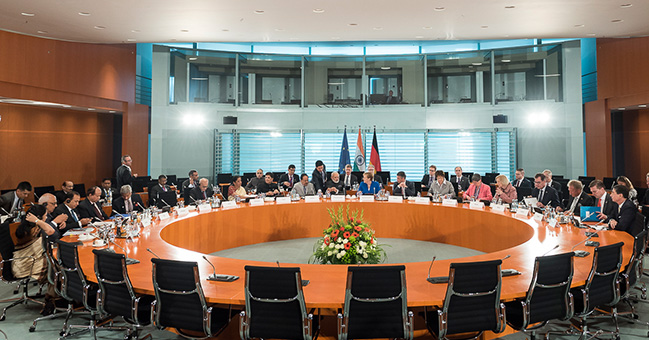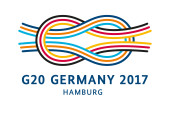German-Indian consultations
"We have taken our strategic partnership to a new level"
Chancellor Angela Merkel has promised Indian Prime Minister Narendra Modi to take cooperation to a new level. Germany will be a fair partner for India, said Angela Merkel following the 4th Indo-German government consultations.
 Cabinet ministers from both countries were involved in the German-Indian government consultations as well as Angela Merkel and Narendra Modi
Photo: Bundesregierung/Kugler
Cabinet ministers from both countries were involved in the German-Indian government consultations as well as Angela Merkel and Narendra Modi
Photo: Bundesregierung/Kugler
The two countries signed agreements in the fields of industry, science and research, and education.
The strategic partnership between Germany and India has been intensified yet again through this year’s consultations, stressed Chancellor Angela Merkel following the 4th Indo-German government consultations. Indian Prime Minister Narendra Modi declared that relations between Germany and India are no longer of purely bilateral importance, but of international significance.
Preparations for the G20 summit
Consultations between the two nations focused on regional and global aspects of climate, economic and development policy. In the run-up to the G20 summit in July in Hamburg, they also discussed G20 topics, in particular promoting stability and security. The two countries’ joint engagement for liberty and diversity was another point on the agenda.
Alongside bilateral issues, shaping the global order was a salient issue during talks. "India is a democracy and counts on the world being networked and sensibly shaped." That is why Germany will be a fair partner both at bilateral level and in international cooperation, said Angela Merkel.
Development budget of one billion
Alongside Chancellor Angela Merkel and Prime Minister Narendra Modi, the pertinent line ministers from the two countries were involved in the consultations. The German side was represented by the Federal Foreign Office, the Federal Ministry for Economic Affairs, the Federal Ministry of Education, the Federal Ministry for the Environment and the Federal Development Ministry.
In the presence of both heads of government, the two countries signed a total of eight agreements. Earlier, a development budget for India worth one billion euros a year had been agreed.
The two sides reaffirmed their desire to cooperate even more closely in future on bilateral, regional and global matters. The Chancellor stressed how the two countries cooperate in the education and research sector, especially with respect to dual vocational training. "We hope to enable a great many Indian managers to incorporate vocational training in their businesses," she underlined.
India to accelerate expansion of renewables
Alongside agreements in the smart cities and transport cooperation sectors, the Chancellor pointed to cooperation in the field of renewable energy. In view of the massive challenges in connection with climate change, she said, it is impressive how India is stepping up the expansion of its use of renewable energy. "I am delighted that India is implementing the Paris Agreement so intensively and so enthusiastically," declared Angela Merkel.
The Chancellor underscored the fact that all issues that Germany’s G20 Presidency has put on the G20 agenda have the support of India. The question of terrorist threats, for instance, played a key part in their talks.
Prime Minister Narendra Modi underlined the importance of bilateral economic cooperation and singled out cooperation within the framework of the Fast Track mechanism and the Make in India programme, to support German companies operating in India.
Narendra Modi pointed to the partnership with Germany in the field of vocational training, which is offering young Indians a wide range of opportunities. Cooperation in the railways sector, in air transport, the road network and in the field of information technology is also very important, he added.
Chancellor advocates unfreezing free trade negotiations
On Tuesday afternoon Angela Merkel and Narendra Modi attended the Indo-German Business Summit. Angela Merkel advocated relaunching the free trade negotiations between the EU and India, which are currently frozen. A great many protectionist trends can currently be seen in the world. Germany, by contrast, wants open and fair global trade, she declared, to the audience of managers from both countries.
The Asia-Pacific Committee of German Business (APA) hosted the bilateral business forum jointly with the Confederation of Indian Industry (CII).
The Asia-Pacific Committee of German Business (APA) is an initiative founded by the Federation of German Industries (BDI), the Association of German Chambers of Commerce and Industry (DIHK), the German Asia-Pacific Business Association (OAV), the Federation of German Wholesale, Foreign Trade and Services (BGA) and the Association of German Banks (Bankenverband). It aims to step up cooperation with countries in the Asia-Pacific Region and promote two-way trade and investment.
Indo-German relations
The Agenda for the Indo-German Partnership in the 21st Century is the foundation for Indo-German relations, Since May 2000 it has been carried forward with a number of new joint declarations.
This regular dialogue gives strong impetus to Indo-German relations. The Cabinet ministers of both countries attend government consultations which are held every two years, alternately in Germany and in India.
For the first round of these consultations, Chancellor Angela Merkel visited Delhi in May 2011. In 2013 the German government invited their Indian counterparts to Berlin. The third bilateral government consultations were held in October 2015 in New Delhi. At these consultations 18 bilateral agreements were signed in sectors as diverse as energy, industry, vocational training, culture and science, security and agriculture.
Tuesday, 30 May 2017

